- Home
- James Herriot
Every Living Thing Page 2
Every Living Thing Read online
Page 2
I heard from Mrs. Bartram again two weeks later. Puppy’s eye was no better, in fact it was worse.
I hurried round to the flat, inhaling the delicious vapours from the shop as I went down the alley. Puppy was in the same position as before, upright, facing his mistress, and there was no doubt there was an increased discharge from the eye. But this time I fancied I could see something else and I leaned forward, peering closely into the dog’s face as a faint but menacing growl warned me not to take any more liberties. And it was there, all right, the cause of the trouble. A tiny papilloma growing from the margin of the eyelid and rubbing on the cornea.
I turned to Mrs. Bartram. “He’s got a little growth in there. It’s irritating his eye and causing the discharge.”
“Growth?” The lady’s face seldom registered any emotion, but one eyebrow twitched upwards and the cigarette trembled briefly in her mouth. “Ah don’t like the sound o’ that.”
“Oh, it’s quite benign,” I said. “Nothing to worry about. I’ll be able to remove it easily and he’ll be perfectly all right afterwards.”
I spoke lightly because indeed these things were quite common and a little injection of local anaesthetic and a quick snip with a pair of curved scissors did the trick effortlessly, but as I looked at the big dog regarding me coldly with his one eye I felt a twinge of anxiety. Things might not be so easy with Puppy.
My misgivings proved to be well founded when Mrs. Bartram brought him round to the surgery next morning and left him in the small consulting room. He would obviously have to be sedated before we could do anything, and among the rush of new drugs were excellent tranquillisers such as acetylpromazine. There was, however, the small matter of one of us grasping that leonine head while the other lifted a fold of skin and inserted the needle. Puppy made it very clear that such things were not on the agenda. Being on strange ground and feeling threatened he came roaring, open-mouthed, at Siegfried and me as soon as we tried to enter the room. We retreated hastily and locked the door.
“Dog catcher?” suggested Siegfried without conviction.
I shook my head. The dog catcher was a snare of soft flex on the end of a long pole and was a handy instrument to slip over a difficult dog’s head and steady it while the injection was made, but with Puppy it would be like trying to lasso a grizzly bear. If we ever managed to get the loop over his head it would be the prelude to a fearsome wrestling match.
However, we’d had tough dogs before and we had a little trick in reserve.
“Looks like one for the Nembutal,” Siegfried murmured and I nodded agreement. For unapproachable cases we kept a supply of succulent minced beef in the fridge. It was a delicacy no dog could resist and it was a simple matter to break a few capsules of Nembutal among the meat and wait while the animal drifted into a state of blissful somnolence. It always worked.
But it was time-consuming. Removing the tiny growth should have been a few minutes’ job and we’d have to wait for twenty minutes or so until the stuff took effect. I tried not to think of the urgent cases all over the countryside needing our attention as I prepared the medicated mince.
The consulting room opened onto the garden through a sash window, which was open a few inches at the bottom. I threw the meat through this aperture and the two of us went into the office to prepare for our rounds.
When we came back we expected to find Puppy slumbering peacefully, but when we peered in he threw himself at the window, snarling like a starving wolf. On the floor the meat lay untouched.
“Look at that!” I cried. “I don’t believe it. No dog’s ever refused that lovely stuff before!”
Siegfried slapped his forehead. “What a damn nuisance! Do you think he can smell the Nembutal? Better try him with a bigger proportion of mince.”
I made up another supply and threw it again through the opening. We retreated to allay the dog’s suspicions, but when we crept up ten minutes later the picture hadn’t changed. Puppy had not eaten a single mouthful.
“What the hell are we going to do?” Siegfried burst out. “It’s going to be lunch time before we get out!”
It was indeed getting on towards lunch time because a gentle breeze was carrying the first fragrance from the fish and chip shop down the street. “Just hang on for a minute,” I said. “I think I know the answer.”
I galloped along Trengate and returned with a bag of chips. It was the work of a moment to insert a capsule in a chip and flick it through the aperture. Puppy was on it like a flash and swallowed it without hesitation. Another chip, another capsule, and so on until he had received the requisite dose.
Even as we watched, the big dog’s ferocity was gradually replaced by an amiable goofiness and when he took a few uncertain steps, then flopped onto his side, we knew we had won. When we finally unlocked the door and entered the room Puppy was in a happy trance, and we performed the operation in a couple of minutes.
He was still dopey and unusually peaceful when his mistress called to collect him later that day. When she brought him into the office, his huge head was level with my desk and he almost smiled at me as I sat down.
“We’ve removed that little thing, Mrs. Bartram,” I said. “His eye will be fine now, but I’m prescribing a course of Lincocin tablets to stop any further infection.”
As I reached for a pen to write the instructions I glanced at the other labels I had written. In those days, before injections became the general procedure, many of our medicines were given by mouth. The instructions on the other labels were varied: “Mixture for bullock. To be given in a pint of treacle water.” “Drench for calf. To be given in half a pint of flour gruel.”
I poised my pen for a moment, then, for the first time in my life, I wrote, “Tablets for dog. One to be given three times daily, inserted in chips.”
Chapter 3
MY THROAT WAS KILLING me. Three successive nocturnal lambings on the windswept hillsides in my shirtsleeves had left me with the beginnings of a cold and I felt in urgent need of a packet of Geoff Hatfield’s cough drops. An unscientific treatment, perhaps, but I had a childish faith in those powerful little candies that exploded in the mouth, sending a blast of medicated vapour surging through the bronchial tubes.
The shop was down a side alley, almost hidden away, and it was so tiny—not much more than a cubby hole— that there was hardly room for the sign, GEOFFREY HATFIELD, CONFECTIONER, above the window. But it was full. It was always full, and, this being market day, it was packed out.
The little bell went “ching” as I opened the door and squeezed into the crush of local ladies and farmers’ wives. I’d have to wait for a while but I didn’t mind, because watching Mr. Hatfield in action was one of the rewarding things in my life.
I had come at a good time, too, because the proprietor was in the middle of one of his selection struggles. He had his back to me, the silver-haired, leonine head nodding slightly on the broad shoulders as he surveyed the rows of tall glass sweet jars against the wall. His hands, clasped behind him, tensed and relaxed repeatedly as he fought his inner battle, then he took a few strides along the row, gazing intently at each jar in turn. It struck me that Lord Nelson pacing the quarter deck of the Victory and wondering how best to engage the enemy could not have displayed a more portentous concentration.
The tension in the little shop rose palpably as he reached up a hand, then withdrew it with a shake of the head, but a sigh went up from the assembled ladies as, with a final grave nod and a squaring of the shoulders, he extended both arms, seized a jar and swung round to face the company. His large Roman senator face was crinkled into a benign smile.
“Now, Mrs. Moffat,” he boomed at a stout matron, holding out the glass vessel with both hands, inclining it slightly with all the grace and deference of a Cartier jeweller displaying a diamond necklace, “I wonder if I can interest you in this.”
Mrs. Moffat, clutching her shopping basket, peered closely at the paper-wrapped confections in the jar. “Well, ah don’t know….”
“If I remember rightly, madam, you indicated that you were seeking something in the nature of a Russian caramel, and I can thoroughly recommend these little sweetmeats. Not quite a Russian, but nevertheless a very nice, smooth-eating toffee.” His expression became serious, expectant.
The fruity tones rolling round his description made me want to grab the sweets and devour them on the spot, and they seemed to have the same effect on the lady. “Right, Mr. Hatfield,” she said eagerly. “I’ll ’ave half a pound.”
The shopkeeper gave a slight bow. “Thank you so much, madam, I’m sure you will not regret your choice.” His features relaxed into a gracious smile and as he lovingly trickled the toffees onto his scales before bagging them with a professional twirl, I felt a renewed desire to get at the things.
Mr. Hatfield, leaning forward with both hands on the counter, kept his gaze on his customer until he had bowed her out of the shop with a courteous “Good day to you, madam.” Then he turned to face the congregation. “Ah, Mrs. Dawson, how very nice to see you. And what is your pleasure this morning?”
The lady, obviously delighted, beamed at him. “I’d like some of them fudge chocolates I ’ad last week, Mr. Hatfield. They were lovely. Have you still got some?”
“Indeed I have, madam, and I am delighted that you approve of my recommendation. Such a deliciously creamy flavour. Also, it so happens that I have just received a consignment in a special presentation box for Easter.” He lifted one from the shelf and balanced it on the palm of his hand. “Really pretty and attractive, don’t you think?”
Mrs. Dawson nodded rapidly. “Oh, aye, that’s real bonny. I’ll take a box and there’s summat else I want. A right big bag of nice boiled sweets for the family to suck at. Mixed colours, you know. What ’ave you got?”
Mr. Hatfield steepled his fingers, gazed at her fixedly and took a long, contemplative breath. He held this pose for several seconds, then he swung round, clasped his hands behind him, and recommenced his inspection of the jars.
That was my favourite bit and, as always, I was enjoying it. It was a familiar scene. The tiny, crowded shop, the proprietor wrestling with his assignment and Alfred sitting at the far end of the counter.
Alfred was Geoff’s cat and he was always there, seated upright and majestic on the polished boards near the curtained doorway that led to the Hatfield sitting room. As usual, he seemed to be taking a keen interest in the proceedings, his gaze moving from his master’s face to the customer’s, and though it may have been my imagination I felt that his expression registered a grave involvement in the negotiations and a deep satisfaction at the outcome. He never left his place or encroached on the rest of the counter, but occasionally one or other of the ladies would stroke his cheek and he would respond with a booming purr and a gracious movement of the head towards them.
It was typical that he never yielded to any unseemly display of emotion. That would have been undignified and dignity was an unchanging part of him. Even as a kitten he had never indulged in immoderate playfulness. I had neutered him three years ago—for which he appeared to bear me no ill will—and he had grown into a massive, benevolent tabby. I looked at him now, sitting in his place. Vast, imperturbable, at peace with his world. There was no doubt he was a cat of enormous presence.
And it had always struck me forcibly that he was exactly like his master in that respect. They were two of a kind and it was no surprise that they were such devoted friends.
When it came to my turn I was able to reach Alfred and I tickled him under his chin. He liked that and raised his head high while the purring rumbled up from the furry rib-cage till it resounded throughout the shop.
Even collecting my cough drops had its touch of ceremony. The big man behind the counter sniffed gravely at the packet, then clapped his hand a few times against his chest. “You can smell the goodness, Mr. Herriot, the beneficial vapours. These will have you right in no time.” He bowed and smiled and I could swear that Alfred smiled with him.
I squeezed my way out through the ladies and as I walked down the alley I marvelled for the umpteenth time at the phenomenon of Geoffrey Hatfield. There were several other sweet shops in Darrowby, big double-fronted places with their wares attractively displayed in the windows, but none of them did anything like the trade of the poky establishment I had just left. There was no doubt that it was all due to Geoff’s unique selling technique and it was certainly not an act on his part; it was born of a completely sincere devotion to his calling, a delight in what he was doing.
His manner and “posh” diction gave rise to a certain amount of ribald comment from men who had left the local school with him at the age of fourteen, and in the pubs he was often referred to as “the bishop,” but it was good-natured stuff because he was a well-liked man. And, of course, the ladies adored him and flocked to bask in his attentions.
About a month later I was in the shop again to get some of Rosie’s favourite liquorice all-sorts and the picture was the same—Geoffrey smiling and booming, Alfred in his place, following every move, the pair of them radiating dignity and well-being. As I collected my sweets, the proprietor whispered in my ear.
“I’ll be closing for lunch at twelve noon, Mr. Herriot. Would you be so kind as to call in and examine Alfred?”
“Yes, of course.” I looked along the counter at the big cat. “Is he ill?”
“Oh, no, no…but I just feel there’s something not right.”
Later I knocked at the closed door and Geoffrey let me into the shop, empty for once, then through the curtained doorway into his sitting room. Mrs. Hatfield was at a table, drinking tea. She was a much earthier character than her husband. “Now then, Mr. Herriot, you’ve come to see t’little cat.”
“He isn’t so little,” I said, laughing. And indeed, Alfred looked more massive than ever seated by the fire, looking calmly into the flames. When he saw me he got up, stalked unhurriedly over the carpet and arched his back against my legs. I felt strangely honoured.
“He’s really beautiful, isn’t he?” I murmured. I hadn’t had a close look at him for some time and the friendly face with the dark stripes running down to the intelligent eyes appealed to me as never before. “Yes,” I said, stroking the fur, which shone luxuriantly in the flickering firelight, “you’re a big beautiful fellow.”
I turned to Mr. Hatfield. “He looks fine to me. What is it that’s worrying you?”
“Oh, maybe it’s nothing at all. His appearance certainly has not altered in the slightest, but for over a week now I’ve noticed that he is not quite so keen on his food, not quite so lively. He’s not really ill…he’s just different.”
“I see. Well, let’s have a look at him.” I went over the cat carefully. Temperature was normal, mucous membranes a healthy pink. I got out my stethoscope and auscultated heart and lungs—nothing abnormal to hear. Palpation of the abdomen produced no clue.
“Well, Mr. Hatfield,” I said, “there doesn’t seem to be anything obviously wrong with him. He’s maybe a bit run down, but he doesn’t look it. Anyway, I’ll give him a vitamin injection. That should buck him up. Let me know in a few days if he’s no better.”
“Thank you indeed, sir. I am most grateful. You have set my mind at rest.” The big man reached out a hand to his pet. The confident resonance of his voice was belied by the expression of concern on his face. Seeing them together made me sense anew the similarity of man and cat—human and animal, yes, but alike in their impressiveness.
I heard nothing about Alfred for a week and assumed that he had returned to normal, but then his master telephoned. “He’s just the same, Mr. Herriot. In fact, if anything, he had deteriorated slightly. I would be obliged if you would look at him again.”
It was just as before. Nothing definite to see even on close examination. I put him onto a course of mixed minerals and vitamin tablets. There was no point in launching into treatment with our new antibiotics—there was no elevation of temperature, no indication of any infectious
agent.
I passed the alley every day—it was only about a hundred yards from Skeldale House—and I fell into the habit of stopping and looking in through the little window of the shop. Each day, the familiar scene presented itself; Geoff bowing and smiling to his customers and Alfred sitting in his place at the end of the counter. Everything seemed right, and yet…there was something different about the cat.
I called in one evening and examined him again. “He’s losing weight,” I said.
Geoffrey nodded. “Yes, I do think so. He is still eating fairly well, but not as much as before.”
“Give him another few days on the tablets,” I said, “and if he’s no better I’ll have to get him round to the surgery and go into this thing a bit more deeply.”
I had a nasty feeling there would be no improvement and there wasn’t, so one evening I took a cat cage round to the shop. Alfred was so huge that there was a problem fitting him into the container, but he did not resist as I bundled him gently inside.
At the surgery I took a blood sample from him and X-rayed him. The plate was perfectly clear and when the report came back from the laboratory it showed no abnormality.
In a way, it was reassuring, but that did not help because the steady decline continued. The next few weeks were something like a nightmare. My anxious peering through the shop window became a daily ordeal. The big cat was still in his place, but he was getting thinner and thinner until he was almost unrecognisable. I tried every drug and treatment I could think of, but nothing did any good. I had Siegfried examine him, but he thought as I did. The progressive emaciation was the sort of thing you would expect from an internal tumour, but further X-rays still showed nothing. Alfred must have been thoroughly fed up of all the pushing around, the tests, the kneading of his abdomen, but at no time did he show any annoyance. He accepted the whole thing placidly as was his wont.
There was another factor that made the situation much worse. Geoff himself was wilting under the strain. His comfortable coating of flesh was dropping steadily away from him, the normally florid cheeks were pale and sunken and, worse still, his dramatic selling style appeared to be deserting him. One day I left my viewpoint at the window and pushed my way into the press of ladies in the shop. It was a harrowing scene. Geoff, bowed and shrunken, was taking the orders without even a smile, pouring the sweets listlessly into their bags and mumbling a word or two. Gone was the booming voice and the happy chatter of the customers and a strange silence hung over the company. It was just like any other sweet shop.

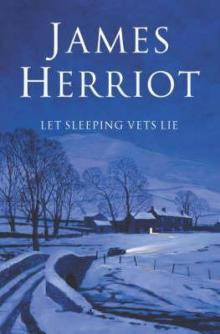 Let Sleeping Vets Lie
Let Sleeping Vets Lie James Herriot's Dog Stories
James Herriot's Dog Stories Vets Might Fly
Vets Might Fly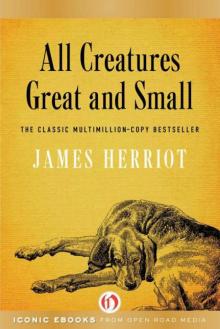 All Creatures Great and Small
All Creatures Great and Small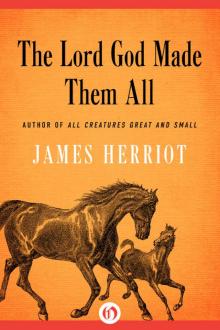 The Lord God Made Them All
The Lord God Made Them All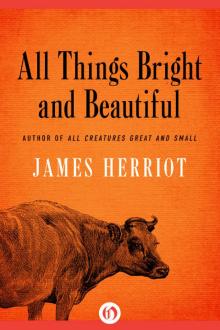 All Things Bright and Beautiful
All Things Bright and Beautiful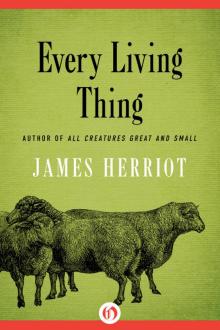 Every Living Thing
Every Living Thing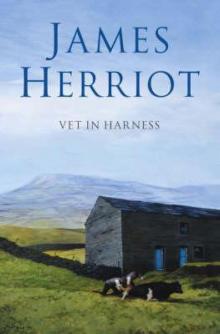 Vet in Harness
Vet in Harness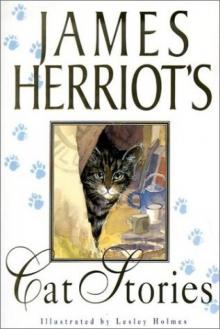 James Herriot's Cat Stories
James Herriot's Cat Stories Vet in a Spin
Vet in a Spin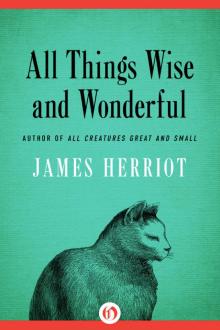 All Things Wise and Wonderful
All Things Wise and Wonderful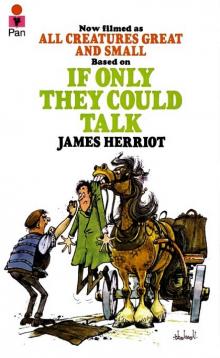 If Only They Could Talk
If Only They Could Talk